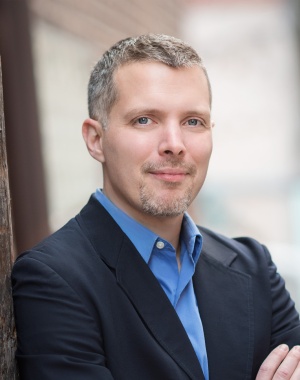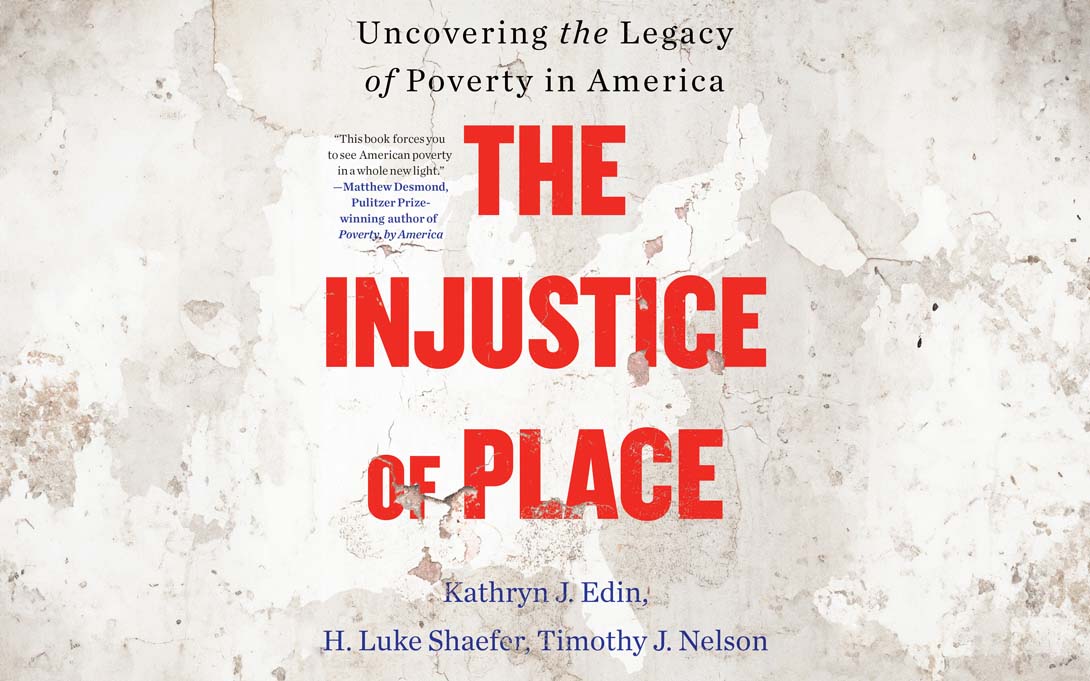
The Injustice of Place book talk and alumni reception
Speaker
H. Luke Shaefer, Kathryn J. Edin, Timothy NelsonDate & time
Location

Join the University of Michigan Gerald R. Ford School of Public Policy and the Princeton School of Public and International Affairs for a joint alumni book talk and reception with the authors of the book The Injustice of Place:
- H. Luke Shaefer, Hermann and Amalie Kohn Professor at the Ford School of Public Policy at the University of Michigan
- Kathryn J. Edin, William Church Osbourne Professor of Sociology and Public Affairs at Princeton University
- Timothy Nelson, Director of Undergraduate Studies in Sociology and Lecturer of Public Affairs at the School of Public and International Affairs at Princeton University
Leading scholars on poverty, the three authors will share key insights from the book, followed by a networking reception and book signing.
About the book
America is rife with “internal colonies,” where systemic violence, resource extraction, and corruption among decision makers have contributed to generations of poverty and disadvantage. These communities suffer from environmental degradation, lack of services, and shortened life expectancy, and they are spread across a wide swath of the country: from Appalachia, to the Tobacco Belt of Virginia and the Carolinas, the Cotton Belt in the South, and South Texas.
These areas are the focus of a new book by the Ford School’s Luke Shaefer, The Injustice of Place: Uncovering the Legacy of Poverty in America, (Harper Collins, August 2023) which links economic data, health outcomes, and local history and traditions. Shaefer, the Hermann and Amalie Kohn Professor of Social Justice and Social Policy and director of Poverty Solutions, co-authored the book with Kathryn Edin, a sociology professor, and Timothy Nelson, director of undergraduate studies in sociology, both at Princeton.
Shaefer and Edin previously collaborated on $2.00 a Day: Living on Almost Nothing in America (Mariner Books, 2016), which was a New York Times Notable Book of the Year.
The places highlighted in The Injustice of Place were identified by an Index of Deep Disadvantage developed by Shaefer, Edin, and Nelson. The index represents a holistic look at disadvantage, using health indicators (life expectancy, low infant birth weight), poverty metrics (rates of poverty and deep poverty), and social mobility data (Opportunity Insights Mobility Metrics).
The researchers found most of the 100 most disadvantaged places in the country are rural, not inner cities. They have spent years immersing themselves in communities in these regions, getting to know the residents.Three of the nation’s top scholars – known for tackling key mysteries about poverty in America – turn their attention from the country’s poorest people to its poorest places. Based on a fresh, data-driven approach, they discover that America’s most disadvantaged communities are not the big cities that get the most notice. Instead, nearly all are rural. Little if any attention has been paid to these places or to the people who make their lives there.
This revelation set in motion a five-year journey across Appalachia, the Cotton and Tobacco Belts of the Deep South, and South Texas. Immersing themselves in these communities, pouring over centuries of local history, attending parades and festivals, the authors trace the legacies of the deepest poverty in America—including inequalities shaping people’s health, livelihoods, and upward social mobility for families. Wrung dry by powerful forces and corrupt government officials, the “internal colonies” in these regions were exploited for their resources and then left to collapse.
The unfolding revelation in The Injustice of Place is not about what sets these places apart, but about what they have in common—a history of raw, intensive resource extraction and human exploitation. This history and its reverberations demand a reckoning and a commitment to wage a new War on Poverty, with the unrelenting focus on our nation’s places of deepest need.
